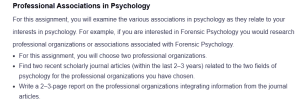Professional Associations in Psychology
For this assignment, you will choose two professional organizations.
Area of Interest: Forensic Psychology
American Academy of Forensic Psychology (AAFP)
In her study, Rocchio (2020) explores ethical principles and challenges in forensic psychology, particularly in complex trauma and dissociation assessments that employ an exploratory research method. She provides practical strategies, essential skills, and professional considerations for competency in this field. The article emphasizes the importance of ethical and professional considerations in forensic psychological evaluations, particularly in the assessment of complex trauma and dissociation (Rocchio, 2020). Forensic practitioners must undergo specialized training, education, and ongoing continuing education to maintain competencies. They must be aware of relevant laws, regulations, cultural competency, and the impact of trauma on the individual and the forensic psychologist. Forensic psychologists should use evidence-based, trauma-informed assessment tools and multiple data sources. They should also be familiar with measures specific to trauma and dissociation. Notably, evaluators prioritizing these ethical and professional aspects can contribute significantly to the field.
Moreover, in the study, Rocchio (2020) explains the significance of special training, professional consultation, and education for forensic practitioners and trauma specialists who want to evaluate victims of complex trauma. The study also stands out in its explanation of the need for continuous personal development through education, and through it, one can see that there is a link between ethical practices and knowledge as well as education for one to give credible services in forensic psychology. The weakness of this study is that the researcher used an exploratory research method that depended much on a literature review (Prakash, 2023). Literature review mostly involves a process where a researcher examines literature and offers their interpretation of the literature and its findings. Therefore, it relies on the researcher’s interpretation, which may be prone to biases. Even so, the ideas shared align with the information given by Prakash (2023) because Prakash (2023) also states that forensic psychology, like other fields of psychology, is guided by ethics and standards that must be adhered to. Most importantly, the study would have offered richer and more valuable information if the researcher used other research methods that limit biases. Nonetheless, the information shared in this study and the ideas
Society for Police and Criminal Psychology (SPCP)
Mental health and crime are interconnected since some crimes occur due to mental illnesses. In this study, Daniel and Treece (2022) examine mental health-seeking behavior among law enforcement officers (LEO) and the factors influencing their decision to seek services. The study specifically investigated factors affecting mental health treatment intentions among low-income individuals, including attitudes, fear of stigma, and social coercion. It connected these intentions to risk and behavior, focusing on past service-seeking patterns to improve treatment pathways (Daniel and Treece, 2022). Results showed that secondary traumatic stress was the primary factor in past behavior, with higher social engagement and pressure to seek help. LEO entered mental health services for various reasons and provider options, with no preferred source. The study’s limitations, including a small sample size and reliance on self-report measures, provide valuable insights into LEO’s mental health pathways.
Prakash (2023) states that mental health in law enforcement is vital and necessary. Notably, mental health for this institution is required because law enforcers deal with many people under crucial circumstances that call for soberness. This idea comes from the research above, especially since it reaffirms that law enforcement needs to encourage help-seeking. The study is undertaken to explore the state of mental health among law enforcers (Prakash, 2023). Moreover, addressing mental health helps officers manage stress and trauma, improves job performance, and maintains physical health. Mental health also impacts decision-making, interpersonal relationships, retention, and recruitment rates. Mental health issues can affect the use of force, crisis intervention, and building trust in the community (Prakash, 2023). It is also important to identify that this research has strengths because it used a qualitative approach and relied on test data. The researchers’ scientific approach offers results that can be generalized. Most importantly, the results help to increase information in forensic psychology.
References
Daniel, A. M., & Treece, K. S. (2022). Law enforcement pathways to mental health: Secondary traumatic stress, social support, and social pressure. Journal of Police and Criminal Psychology, 37(1), 132–140. https://doi.org/10.1007/s11896-021-09476-5
Prakash, B. (2023). Forensic psychology and its impact on the legal system. Journal of Criminology and Forensic Studies, 5(1), pp. 1–8.
Rocchio, L. M. (2020). Ethical and professional considerations in the forensic assessment of complex trauma and dissociation. Psychological Injury and Law, 13(2), 124–134. https://doi.org/10.1007/s12207-020-09384-9
ORDER A PLAGIARISM-FREE PAPER HERE
We’ll write everything from scratch
Question
Professional Associations in Psychology
For this assignment, you will examine the various associations in psychology as they relate to your interests in psychology. For example, if you are interested in Forensic Psychology you would research professional organizations or associations associated with Forensic Psychology.

Professional Associations in Psychology
- For this assignment, you will choose two professional organizations.
- Find two recent scholarly journal articles (within the last 2–3 years) related to the two fields of psychology for the professional organizations you have chosen.
- Write a 2–3-page report on the professional organizations integrating information from the journal articles.

